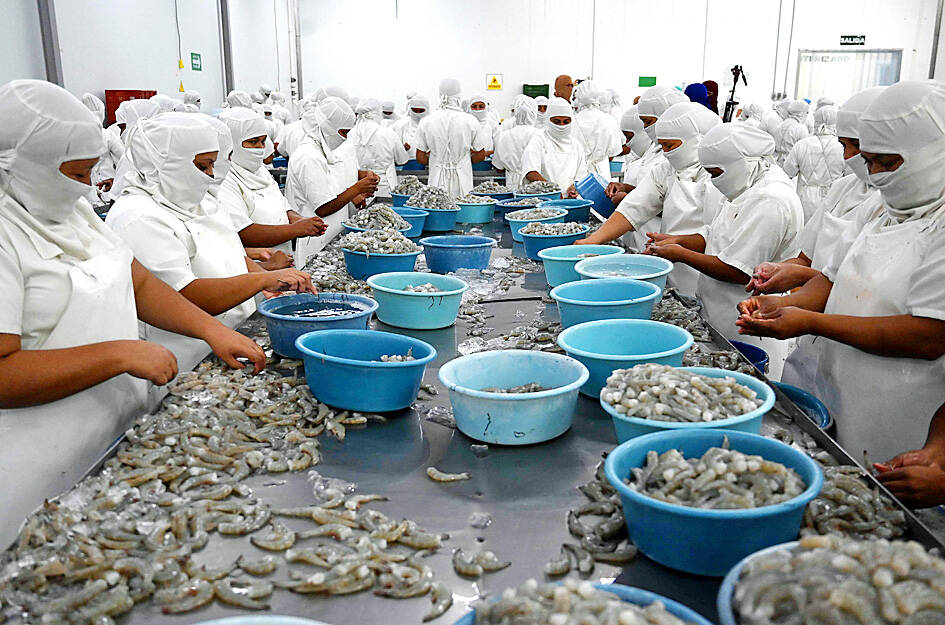Honduras is paying off loans it received from Taiwanese banks according to contract stipulations, the Ministry of Foreign Affairs said yesterday after a Honduran newspaper reported that the country owes Taiwan more than US$440 million.
Honduras has not repaid the debt 11 months after it severed diplomatic ties with Taipei, Honduran newspaper La Prensa reported on Wednesday, citing Honduran Ministry of Finance data.
Taiwan terminated diplomatic relations with Tegucigalpa after the Honduran Ministry of Foreign Affairs in March last year announced on social media that it would cut its ties with Taiwan.

Photo: AFP
This was another example of China using the lure of economic gain to poach Taiwan’s allies, Minister of Foreign Affairs Joseph Wu (吳釗燮) said at the time.
The Presidential Office has made clear that Taiwan would “not engage in a meaningless contest of dollar diplomacy with China.”
The Honduran government justified its decision on the grounds that it was “seeking greater economic support and loans,” the newspaper reported.
The administration of Honduran President Xiomara Castro has not sought loans from Taiwan and the most recent loan it was granted was US$300 million in 2019 when Juan Orlando Hernandez was Honduran president, it said.
The funds from Taiwan have been allocated for housing reconstruction, school infrastructure, school meals and other projects, it said.
In Taipei, Ministry of Foreign Affairs spokesman Jeff Liu (劉永健) yesterday said that the reported debts are commercial loan arrangements by Taiwanese banks to the Honduran government.
The contracts clearly state the rights and obligations of both parties, and include dispute settlement mechanisms and legal jurisdictions, Liu said.
The termination of diplomatic ties does not affect the contracts, so the Central American country still has to repay the loans, he said, adding that it has been doing so.
If there is a breach of contract, the banks can take legal action through international judicial channels, which is standard practice regarding commercial loans, he said.
Meanwhile, Quintin Soriano, the mayor of Choluteca — the capital of a major shrimp farming region of the same name — called on the Honduran government to solve challenges faced by the country’s shrimp industry after Taiwan reduced imports of such products after diplomatic ties were cut and China failed to provide subsidies it had promised, Honduran newspaper La Tribuna reported on Wednesday.
Tegucigalpa terminated commercial and diplomatic ties with Taiwan — a nation with a good market for shrimp — while farmers are reluctant to export to China because prices there are so low and Mexico closed its market to the product, Soriano said.
If the problem is not solved, about 40,000 people in Choluteca region would lose their jobs and “there would be a revolt,” he said.
Taiwan last year reduced shrimp imports from Honduras, but remained its biggest export destination, importing more than 24 million pounds (10,886 tonnes), down from 29 million pounds in 2022, National Association of Aquaculture Farmers of Honduras data showed.

Chinese Nationalist Party (KMT) Chairman Eric Chu (朱立倫), spokeswoman Yang Chih-yu (楊智伃) and Legislator Hsieh Lung-chieh (謝龍介) would be summoned by police for questioning for leading an illegal assembly on Thursday evening last week, Minister of the Interior Liu Shyh-fang (劉世芳) said today. The three KMT officials led an assembly outside the Taipei City Prosecutors’ Office, a restricted area where public assembly is not allowed, protesting the questioning of several KMT staff and searches of KMT headquarters and offices in a recall petition forgery case. Chu, Yang and Hsieh are all suspected of contravening the Assembly and Parade Act (集會遊行法) by holding

PRAISE: Japanese visitor Takashi Kubota said the Taiwanese temple architecture images showcased in the AI Art Gallery were the most impressive displays he saw Taiwan does not have an official pavilion at the World Expo in Osaka, Japan, because of its diplomatic predicament, but the government-backed Tech World pavilion is drawing interest with its unique recreations of works by Taiwanese artists. The pavilion features an artificial intelligence (AI)-based art gallery showcasing works of famous Taiwanese artists from the Japanese colonial period using innovative technologies. Among its main simulated displays are Eastern gouache paintings by Chen Chin (陳進), Lin Yu-shan (林玉山) and Kuo Hsueh-hu (郭雪湖), who were the three young Taiwanese painters selected for the East Asian Painting exhibition in 1927. Gouache is a water-based

Taiwan would welcome the return of Honduras as a diplomatic ally if its next president decides to make such a move, Minister of Foreign Affairs Lin Chia-lung (林佳龍) said yesterday. “Of course, we would welcome Honduras if they want to restore diplomatic ties with Taiwan after their elections,” Lin said at a meeting of the legislature’s Foreign Affairs and National Defense Committee, when asked to comment on statements made by two of the three Honduran presidential candidates during the presidential campaign in the Central American country. Taiwan is paying close attention to the region as a whole in the wake of a

OFF-TARGET: More than 30,000 participants were expected to take part in the Games next month, but only 6,550 foreign and 19,400 Taiwanese athletes have registered Taipei city councilors yesterday blasted the organizers of next month’s World Masters Games over sudden timetable and venue changes, which they said have caused thousands of participants to back out of the international sporting event, among other organizational issues. They also cited visa delays and political interference by China as reasons many foreign athletes are requesting refunds for the event, to be held from May 17 to 30. Jointly organized by the Taipei and New Taipei City governments, the games have been rocked by numerous controversies since preparations began in 2020. Taipei City Councilor Lin Yen-feng (林延鳳) said yesterday that new measures by